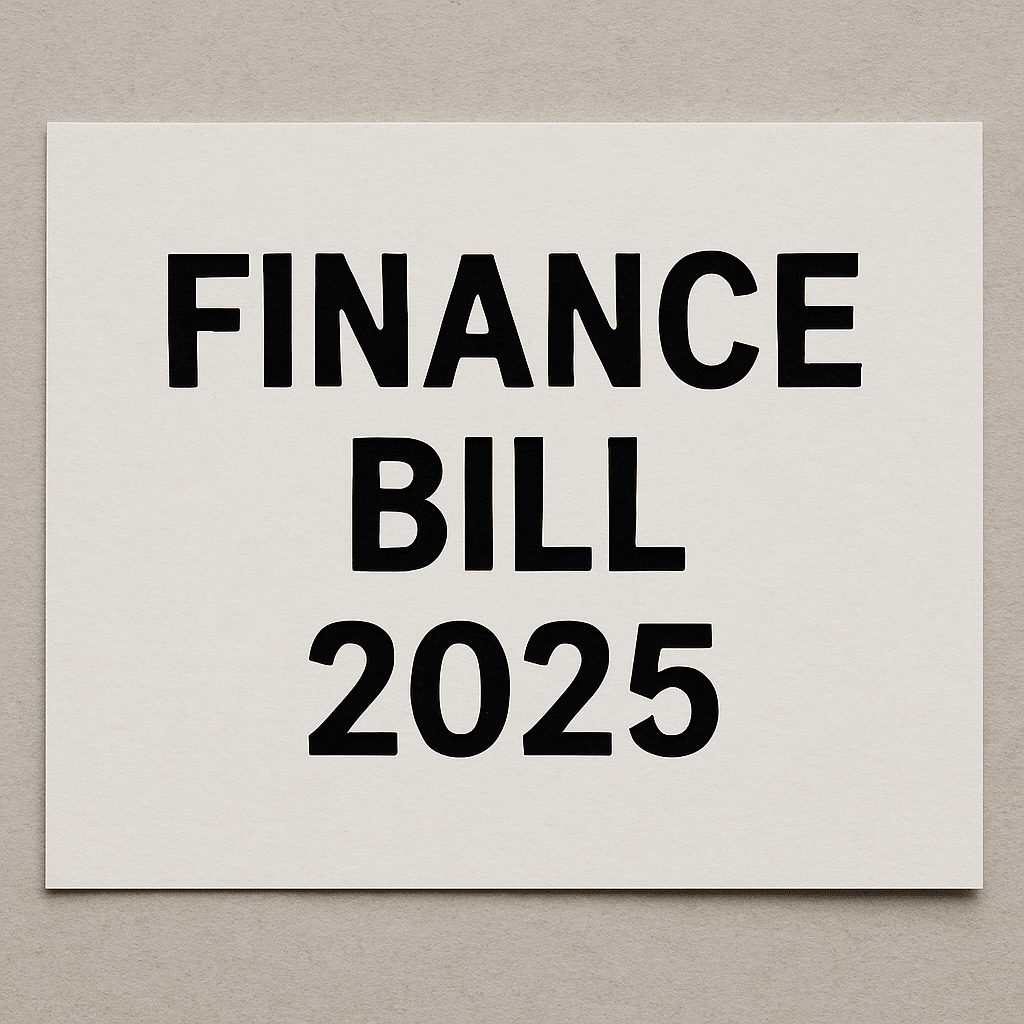Finance Bill 2025: New Taxes, Digital Economy Reforms, and What They Mean for Kenyans

The Finance Bill 2025 proposes a comprehensive overhaul of various tax statutes in Kenya, targeting income tax, value-added tax (VAT), excise duty, and miscellaneous levies. The Bill, if enacted, will take effect from 1st July 2025, with select provisions (notably Sections 12 and 56) coming into force on 1st January 2026 (Clause 1, p. 1).
1. New and Modified Taxes
Several provisions in the Bill either introduce new tax concepts or significantly amend existing structures. Notable among them are:
- Minimum Top-Up Tax: Introduced under a new subsection 3A in Section 12G of the Income Tax Act. Entities subject to this tax must pay it by the end of the fourth month after their financial year ends (Clause 7, p. 3).
- Top-Up on Turnover Tax: Under Section 12E, digital and electronic businesses are explicitly targeted, expanding the scope to include sales over the internet or an electronic network (Clause 6, p. 3).
- Expanded Definition of Royalties: Now includes software distributions involving regular usage payments, thereby widening the scope of taxable royalties (Clause 2(a)(iii), p. 1).
- Excise on Scrap Sales and Public Supply: Section 10 of the Income Tax Act is amended to classify “sale of scrap” and “supply of goods to a public entity” as subject to tax (Clause 5, p. 3).
2. Extensions and Increases of Existing Taxes
The Finance Bill proposes several increases and administrative extensions:
- PAYE (Pay As You Earn) Threshold Adjustment: The allowable monthly tax relief threshold under Section 5 of the Income Tax Act is increased from KES 2,000 to KES 10,000 (Clause 3, p. 2).
- Deletion of “Compensating Tax”: The definition has been removed, likely signaling an administrative shift rather than a rate increase (Clause 2(a)(iv), p. 1).
- Tightening of Related Party Rules: A more expansive definition of “related person” now includes family connections and cross-participation in management, control, or capital of businesses (Clause 2(a)(vii), p. 1).
- VAT and Excise Duty Adjustments: While exact rates are not stated in the preview, structural changes are introduced that will affect implementation, especially in the digital economy.
3. Impact on Kenyan Citizens and Businesses
The Finance Bill will have varied implications across demographics:
- Digital Entrepreneurs and SMEs:
- Will face increased compliance and potential tax burdens, particularly with the expanded turnover tax and digital economy provisions.
- Employees and Low-Income Earners:
- The increase in the PAYE threshold (to KES 10,000) provides minor relief for lower-income earners.
- Public Suppliers and Scrap Traders:
- These groups will newly fall under income tax obligations, increasing their tax exposure.
- Multinational and Related-Party Entities:
- Stricter transfer pricing and related-party definitions could increase audit risk and tax liabilities.
Further Detail
- The Finance Bill reflects an ongoing policy push to enhance domestic resource mobilization.
- Key changes reflect efforts to widen the tax base, especially within informal and digital sectors.
- Administrative reforms (such as tax due dates and definition cleanups) are also prominent, likely intended to streamline enforcement.
Conclusion
The Finance Bill 2025 proposes wide-ranging tax reforms. While it introduces administrative improvements and relief for some individuals, it also expands taxation into new sectors and tightens compliance. Kenyans—particularly those operating digitally or informally—should prepare for a more complex tax landscape ahead.
For full legal implications, consult the Bill directly or seek guidance from tax professionals.
Remember!
Need cash fast? Use your car to unlock up to 1 million in just 24 hours
Contact us through our contact form, call us on +254791573231 or visit one of our branches across Nairobi, Kiambu, Machakos, and Kajiado counties to explore your financial options.




Comments ()